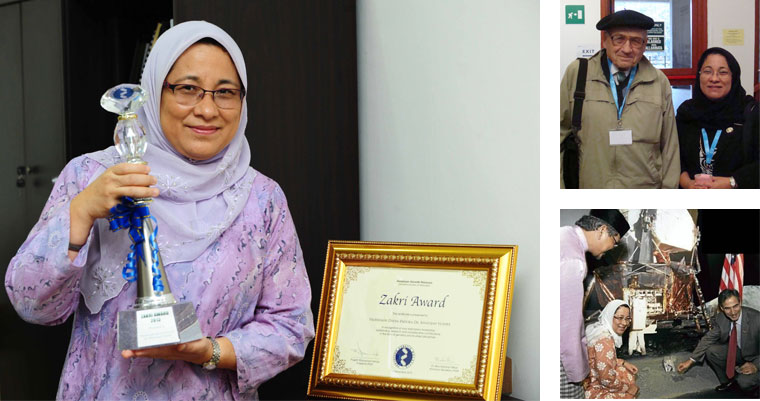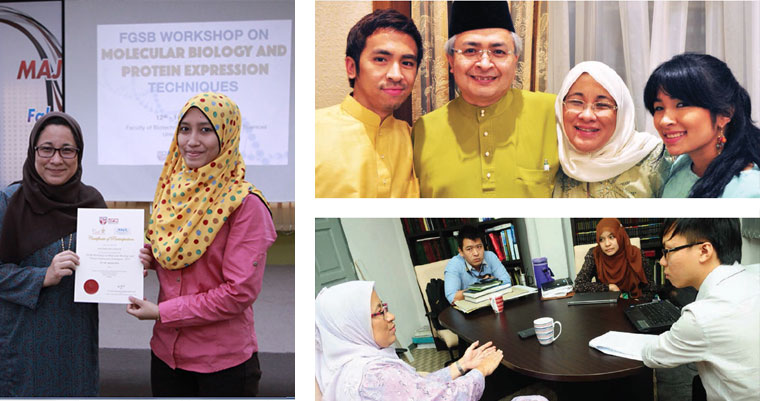“Never give up, value the importance of teamwork and, finally, do something that they love.”
- Professor Datin Paduka Dr Khatijah Mohamad Yusoff -
Pioneering Virologist and Academic Luminary
In the realm of academia and virology, Professor Datin Paduka Dr Khatijah Mohamad Yusoff has emerged as a revered figure, with a distinguished career marked by groundbreaking contributions to microbiology and the Newcastle Disease Virus (NDV), a significant poultry virus.
Her dedication to microbiology and virology is evident in her efforts to enhance the comprehension and diagnosis of contagious and fatal viruses in poultry. Moreover, through her exploration of the virus's potential in fighting cancer cells, she is unravelling exciting and innovative mechanisms that will create a positive impact on Malaysia and its people.
Unlocking The NDV Virus’ Potential In Cancer Treatment
Born in Penang in 1956, Professor Khatijah's academic journey commenced with a Colombo Plan Scholarship to La Trobe University, Australia. Her dedication led to a First-Class Honours degree in Microbiology in 1979. A subsequent La Trobe University research scholarship propelled her into the realm of molecular analysis, culminating in a pioneering PhD on the genetic intricacies of plasmid RP1.
Her post-doctoral fellowship at the University of Newcastle-upon-Tyne in 1985 was transformative, marking her as the first to sequence the complete L gene, a vital component in NDV replication. This laid the foundation for her extensive work on NDV, epitope mapping and the molecular biology of local NDV strains.
Beyond virology, Professor Khatijah's research has ventured into understanding virus-cancer cell interactions. NDV's unique proclivity to target human cancer cells has inspired her to explore its potential as an anticancer agent and drug carrier. Her research team pioneers innovative delivery systems using lactic acid bacteria and nanobiotechnology, specifically designed to recognise surface antigens on cancer cells.

Advocacy and Policy Leadership in Science
As a staunch advocate of science, Professor Khatijah's five-year tenure as Deputy Secretary General of Malaysia's Ministry of Science, Technology and Innovation (MOSTI) showcased her commitment to policy development and science management. Her initiatives include reactivating the Office of the Science Advisor to the Prime Minister and establishing key entities such as the National Science and Research Council, the Nanotechnology Directorate and the National Bioethics Council.
From International Boardrooms, To University Classrooms
Professor Khatijah's belief in translating science for global benefit led her to the Board of Trustees of the international Livestock Research Institute (ILRI) in Kenya and Ethiopia. This organisation, backed by governments and philanthropists, is dedicated to bringing scientific advancements to impoverished farmers in Africa.
Her role as a dedicated teacher is evident through her numerous accolades, including the Excellent Service Award from Universiti Putra Malaysia (UPM). Emphasising the importance of a "community of researchers," she has inspired many students to pursue postgraduate studies and become academicians.
Global Impact and Legacy in Microbiology
Internationally recognised for her contributions, Professor Khatijah has received prestigious awards, including UNESCO's Carlos Finlay Prize and the Houghton Trust's 3rd Houghton Lecture. She was named one of the top 20 most influential women in science in the Islamic World in 2014.
As the current Dean of the Faculty of Biotechnology and Biomolecular Sciences at UPM, Professor Khatijah's work has not only earned her local and global acclaim but has also positioned Malaysia prominently in the field of microbiology. Her journey illustrates the transformative power of science for societal benefit.


Disclaimer:
The information in this award recipient's profile is accurate to the best of our knowledge as of the time the award was presented. Any subsequent changes, updates, or developments in the individual's life or achievements may not be reflected in this profile.